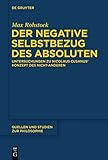Der negative Selbstbezug des Absoluten : Untersuchungen zu Nicolaus Cusanus' Konzept des Nicht-Anderen / Max Rohstock.
Material type: TextSeries: Quellen und Studien zur Philosophie ; 119Publisher: Berlin ; Boston : De Gruyter, [2014]Copyright date: ©2014Description: 1 online resource (231 p.)Content type:
TextSeries: Quellen und Studien zur Philosophie ; 119Publisher: Berlin ; Boston : De Gruyter, [2014]Copyright date: ©2014Description: 1 online resource (231 p.)Content type: - 9783110359206
- 9783110386769
- 9783110359244
- Absolute, The
- Negative theology -- Christianity
- Negative theology
- Neoplatonism
- Ontology -- History
- Philosophy, Medieval -- History
- Philosophy, Medieval
- Self -- History
- Johannes Scottus Eriugena
- Negative Theologie
- Neuplatonismus
- PHILOSOPHY / History & Surveys / Medieval
- Johannes Scottus Eriugena
- Negative theology
- Neo-Platonism
- 111.6 22/ger
- B23 .Q45 v.119
- online - DeGruyter
- Issued also in print.
| Item type | Current library | Call number | URL | Status | Notes | Barcode | |
|---|---|---|---|---|---|---|---|
 eBook
eBook
|
Biblioteca "Angelicum" Pont. Univ. S.Tommaso d'Aquino Nuvola online | online - DeGruyter (Browse shelf(Opens below)) | Online access | Not for loan (Accesso limitato) | Accesso per gli utenti autorizzati / Access for authorized users | (dgr)9783110359244 |
Frontmatter -- Vorwort -- Inhalt -- I. Einleitung -- II. Nicolaus Cusanus -- III. Proklos und Dionysios (Ps.-)Areopagitês: Vordenker eines negativen Selbstbezugs? -- IV. Johannes Scottus Eriugena -- V. Konklusion -- VI. Anhang
restricted access online access with authorization star
http://purl.org/coar/access_right/c_16ec
In De li non aliud (Über das Nicht-Andere) von 1461/2 entwickelt Nicolaus Cusanus den markanten wie ungewöhnlichen Gottesbegriff non aliud. Damit konzipiert Cusanus einen der spektakulärsten Gedanken der Metaphysikgeschichte: den negativen Selbstbezug des Absoluten. In der vorliegenden Arbeit untersucht Max Rohstock dieses Konzept systematisch und historisch. Damit kann er gleich mehrere Forschungsdesiderate einlösen. Zum einen klärt er umfassend die Funktion der in der Cusanusforschung umstrittenen negativen Theologie. Er zeigt, dass Cusanus die negative Theologie originell ausdeutet und mit seiner Schrift über das Nicht-Andere ein "Manifest" für die negative Theologie entwirft. Zudem weist der Autor nach, dass der irische Philosoph Johannes Scottus Eriugena (9. Jh.) Vater dieses cusanischen Konzeptes war.
Nicolas of Cusa’s notion of God as “non aliud” is one of the most spectacular ideas in the history of metaphysics – the negative self-reference of the Absolute. In this study, Max Rohstock examines this concept historically and systematically. For the first time, he shows Johannes Scotus Eriugena was the true progenitor of the concept.
Issued also in print.
Mode of access: Internet via World Wide Web.
In German.
Description based on online resource; title from PDF title page (publisher's Web site, viewed 28. Feb 2023)


